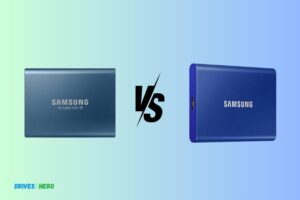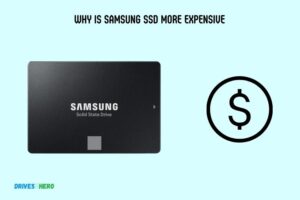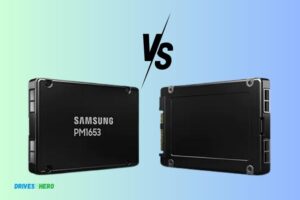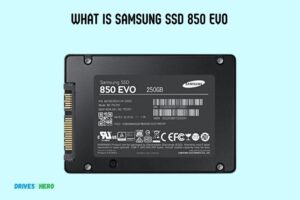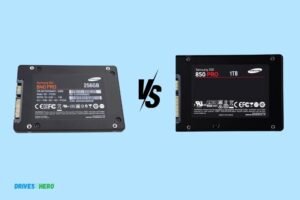Adata Ssd Vs Samsung Ssd: Which Is More Favorable?
When comparing the Adata SSD with the Samsung SSD, Samsung SSDs are generally more durable and offer faster data transfer speeds than the Adata SSD.
However, Adata SSDs tend to be more cost-effective and offer excellent value for money. Samsung is well known for its quality and reliability, and its SSDs are no exception. They offer high-speed data transfer and long-lasting durability, making them a favorite among professionals.
On the other hand, Adata is a brand that offers solid performance at a more affordable price point. Their SSDs may not be as fast or as durable as Samsung’s, but they offer excellent value for money, especially for budget-conscious consumers.
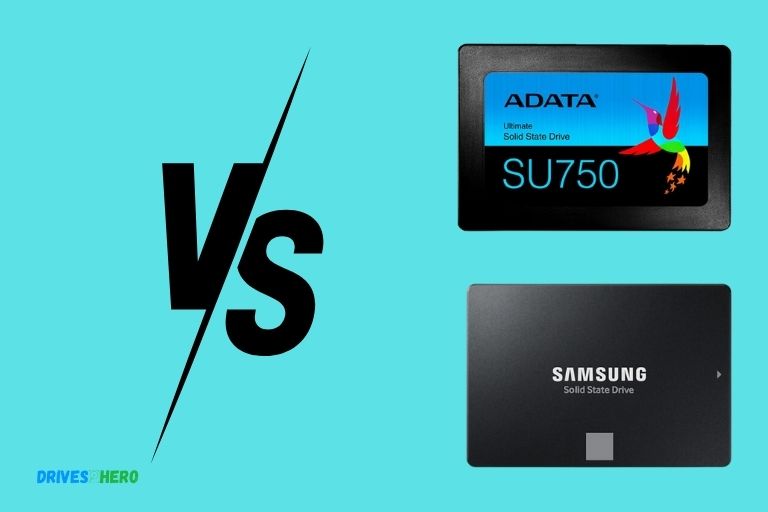
Key Takeaway
Understanding The Difference Between Adata And Samsung Ssds
Compare Adata SSDs vs Samsung SSDs and find the perfect fit for your requirements. SSDs, or solid-state drives, have become increasingly popular due to their numerous benefits over traditional hard drives.
Here’s a basic table outlining some general differences between ADATA and Samsung SSDs:
| Feature | ADATA SSDs | Samsung SSDs |
|---|---|---|
| Performance | Performance varies by model. Some models offer competitive speeds. | Generally known for high-performance, especially in the EVO and PRO series. |
| Form Factor | Available in various form factors, including 2.5-inch SATA and M.2 NVMe. | Offers a range of form factors, including 2.5-inch SATA and M.2 NVMe. |
| NAND Technology | Uses various NAND types, including 3D NAND. | Utilizes advanced NAND technologies, such as V-NAND, providing enhanced durability and performance. |
| Durability | Durability depends on the specific model. May have varying levels of endurance. | Samsung SSDs are often known for their durability and reliability. |
| Compatibility | Generally compatible with a wide range of systems. | Compatible with a broad array of systems; Samsung provides firmware updates for ongoing compatibility. |
| Software & Features | May offer proprietary software for monitoring and maintenance. | Samsung provides robust software like Magician for monitoring, optimization, and firmware updates. |
| Price | ADATA SSDs often provide competitive pricing. | Samsung SSDs may be priced slightly higher, but they are often considered a premium and reliable choice. |
| Warranty | Warranty periods vary by model; typically standard limited warranties. | Samsung usually offers competitive warranty periods for their SSDs. |
Adata and Samsung are both prominent players in the SSD market, each offering their own unique benefits and features.
Performance And Speed: Adata Ssds Vs Samsung Ssds
Adata SSDs and Samsung SSDs are both reliable choices for high performance and speed. Compare the two to find the perfect option for your specific needs.
Let’s dive in and explore the differences between Adata and Samsung SSDs in terms of performance and speed:
Comparing The Read And Write Speeds Of Adata And Samsung Ssds:
- Adata offers SSDs with competitive read and write speeds, providing users with fast data transfer rates.
- Samsung SSDs, on the other hand, are well-known for their impressive read and write speeds, pushing the boundaries of performance.
Benchmark Tests And Real-World Performance Examples:
- Both Adata and Samsung SSDs have undergone extensive benchmark tests to evaluate their performance in various scenarios.
- In these tests, Samsung SSDs consistently demonstrate exceptional speeds, outperforming many other brands in the market.
- Real-world performance examples also paint a similar picture, with Samsung SSDs delivering fast load times and improved system responsiveness.
How The Controller And Nand Flash Technology Impact Performance:
- The controller plays a crucial role in an SSD’s performance. Samsung has developed advanced controllers that optimize data processing, resulting in improved overall performance.
- Adata SSDs also incorporate high-quality controllers that contribute to their impressive speeds and reliability.
- NAND flash technology, an essential component of SSDs, affects performance. Both Adata and Samsung utilize advanced NAND flash technology, but Samsung SSDs often employ the latest generations, offering better performance and endurance.
Factors To Consider For Different Use Cases (Gaming, Multimedia, Business):
- Gaming: For gamers, both Adata and Samsung SSDs can significantly enhance gaming experiences by reducing load times and providing faster file access.
- Multimedia: Adata and Samsung SSDs cater to multimedia needs, allowing quick transfer and playback of multimedia files, reducing lag, and enabling smoother editing processes.
- Business: In business settings, SSDs can boost productivity and enhance data access speeds. Both Adata and Samsung SSDs offer reliable storage solutions ideal for business applications, with Samsung generally providing slightly faster performance.
Adata and Samsung SSDs offer impressive performance and speed, but Samsung often leads the pack. However, Adata SSDs still provide reliable and fast storage solutions that are suitable for various use cases.
Reliability And Durability: Adata Ssds Vs Samsung Ssds
Adata SSDs and Samsung SSDs are both known for their reliability and durability. They offer high-performance storage solutions that ensure your data is secure and your system runs smoothly.
Examining The Mtbf And Tbw Ratings:
Here’s how Adata SSDs and Samsung SSDs stack up in these areas:
Adata SSDs:
- MTBF rating: Adata SSDs boast an impressive MTBF rating of up to 2 million hours. This means that they are designed to handle continuous operation for a long period of time without failure.
- TBW rating: Adata SSDs also offer high TBW ratings, indicating the amount of data that can be written to the drive before its performance starts to degrade.
Samsung SSDs:
- MTBF rating: Samsung SSDs also excel in terms of reliability, with MTBF ratings that can reach up to 1.5 million hours. This ensures long-term stability and minimal chances of failure.
- TBW rating: Samsung SSDs are known for their exceptional endurance, with TBW ratings surpassing hundreds of terabytes and even reaching multiple petabytes. These high TBW ratings make Samsung SSDs a dependable choice for heavy workloads and demanding applications.
In terms of both MTBF and TBW ratings, both Adata and Samsung SSDs offer impressive levels of reliability and durability, making them suitable options for various storage needs.
Endurance And Longevity Of Adata And Samsung Ssds:
Here’s how Adata and Samsung SSDs fare in these aspects:
Adata SSDs:
Endurance: Adata SSDs are designed to withstand heavy use and provide long-term performance. With high-quality NAND flash memory and advanced technologies, Adata SSDs offer excellent endurance and can handle extensive read and write operations.
Longevity: Adata SSDs are built to last, providing reliable storage solutions for years to come. Their durable construction ensures consistent performance even under demanding conditions, making them suitable for both personal and professional use.
Samsung SSDs:
Endurance: Samsung SSDs are renowned for their exceptional endurance, thanks to advanced technologies like TRIM support and wear-leveling algorithms.
These features optimize performance and extend the lifespan of the drive, ensuring reliable operation even during intensive workloads.
Longevity: Samsung SSDs are built to endure, delivering consistent performance and reliability for an extended period of time.
Whether it’s for gaming, creative work, or everyday computing, Samsung SSDs offer a reliable storage solution that can withstand the test of time.
The Impact Of Firmware Updates And Support On Reliability:
Here’s how Adata and Samsung approach firmware updates and support:
Adata SSDs:
Firmware updates: Adata regularly provides firmware updates for their SSDs to address any potential issues, improve performance, and enhance compatibility with the latest technologies. These updates can be easily installed to ensure your Adata SSD operates at its best.
Support: Adata offers reliable customer support services, assisting users with any inquiries or concerns they may have regarding their SSDs. Timely assistance and resources contribute to a positive user experience.
Samsung SSDs:
Firmware updates: Samsung also releases firmware updates periodically to enhance SSD performance, fix bugs, and address compatibility issues. Keeping your Samsung SSD up to date with the latest firmware ensures optimal performance and reliability.
Support: Samsung provides comprehensive customer support, offering technical guidance and prompt assistance to address any SSD-related concerns. Their knowledgeable support team is dedicated to helping users make the most of their Samsung SSDs.
By prioritizing firmware updates and customer support, both Adata and Samsung aim to ensure the longevity and reliability of their SSDs.When it comes to reliability and durability, both Adata and Samsung SSDs excel in their respective ways.
Making The Right Choice: Factors To Consider
When comparing Adata SSD and Samsung SSD, it is important to consider factors such as performance, reliability, and price.
Summarizing The Key Differences And Similarities Between Adata And Samsung Ssds:
- Performance: Adata and Samsung SSDs both deliver impressive performance, with fast read and write speeds. However, Samsung SSDs are often considered to have a slight edge in terms of overall performance.
- Reliability: Samsung SSDs are renowned for their reliability and are backed by a solid reputation. Adata SSDs also offer reliable performance, although they may not be as widely recognized in this regard.
- Price: Adata SSDs tend to be more budget-friendly compared to Samsung SSDs. If you’re looking for a cost-effective option without compromising too much on performance, Adata SSDs could be a viable choice.
- Capacity Options: Both brands come in a range of capacity options to suit various storage needs. From entry-level capacities to high-end options, you can find the right SSD size that meets your requirements.
- Warranty: Samsung typically offers longer warranty periods compared to Adata. This extended warranty coverage can provide you with greater peace of mind when investing in a solid-state drive.
Considering these factors will help you determine which SSD brand aligns best with your specific needs.
Outlining The Most Important Factors To Consider When Making A Decision:
- Performance Requirements: Identify the level of performance you need. If you require blazing-fast speeds for demanding tasks like gaming or video editing, prioritize SSDs with higher read and write speeds.
- Budget: Determine how much you’re willing to spend. This will help you narrow down your choices and find an SSD within your price range.
- Storage Capacity: Assess your storage needs. Are you looking for ample space for multimedia files or mainly using your SSD for the operating system and applications? Consider the amount of storage you require before making a decision.
- Reliability: Consider the brand reputation and warranty offered by each SSD manufacturer. Opting for a reliable and trustworthy brand can minimize the chances of data loss or drive failure.
- Compatibility: Check if the SSD is compatible with your system. Ensure it supports the appropriate interface (e.g., SATA, NVMe) and the form factor (e.g., 2.5-inch, M.2) that your motherboard or laptop supports.
By carefully evaluating these factors, you can make an informed decision and find the SSD that best suits your needs.
Understanding Your Specific Needs And Use Case Scenarios:
To tailor your choice to your requirements, ask yourself the following questions:
- What is the primary purpose of the SSD? Determine whether you need it for gaming, professional work, or general system use.
- Do you require faster boot times and application loading? Consider an SSD with higher read speeds to optimize system responsiveness.
- Will you be dealing with large file transfers or editing high-resolution media? Look for SSDs with excellent write speeds to facilitate faster file transfers or rendering processes.
- Are you concerned about data security and reliability? Opt for SSDs with features like hardware encryption or built-in error correction mechanisms for enhanced data protection.
Understanding your specific needs will help narrow down the choices and ensure you select the most suitable SSD for your use case.
Conclusion
Both Adata SSD and Samsung SSD are top contenders in the market, offering high-performance storage options for users. Adata SSDs provide reliable and cost-effective solutions, ideal for budget-conscious consumers.
On the other hand, Samsung SSDs offer superior performance and durability, making them a preferred choice for users seeking top-of-the-line storage devices.
When it comes to speed, both brands offer impressive write and read speeds, ensuring quick access to data and minimal load times for applications.
Their wide range of storage capacities allows users to choose an SSD that suits their specific needs. It’s essential to consider factors such as storage capacity, performance, durability, and price when selecting an SSD.

